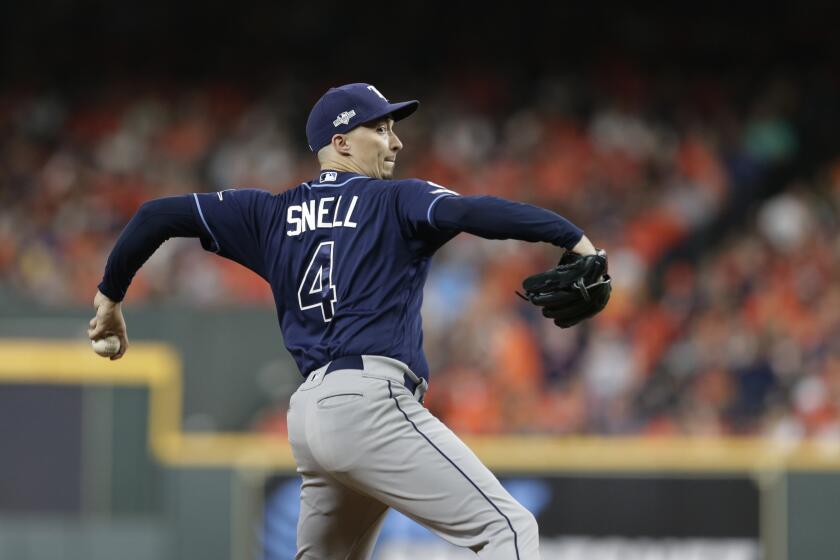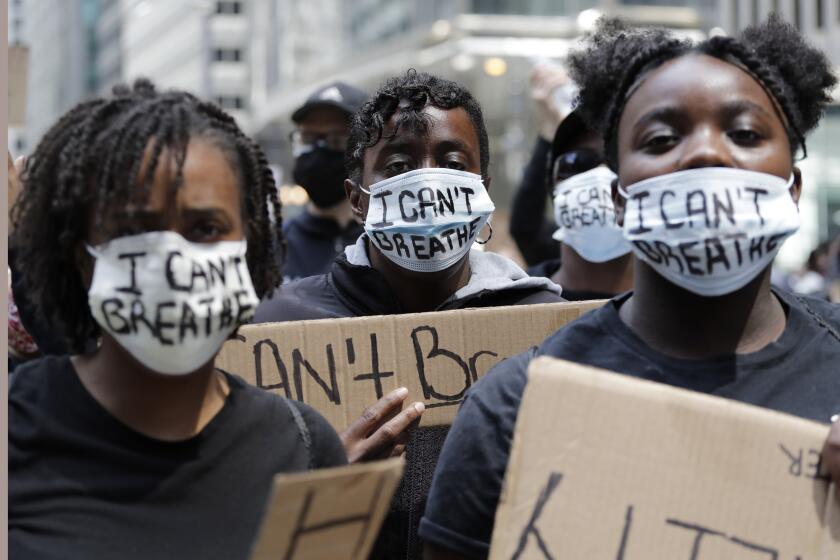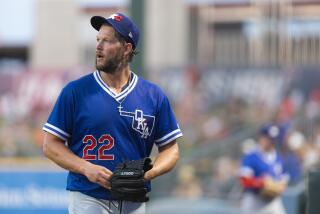Column: Former Dodger Adrián González does not see baseball returning in 2020
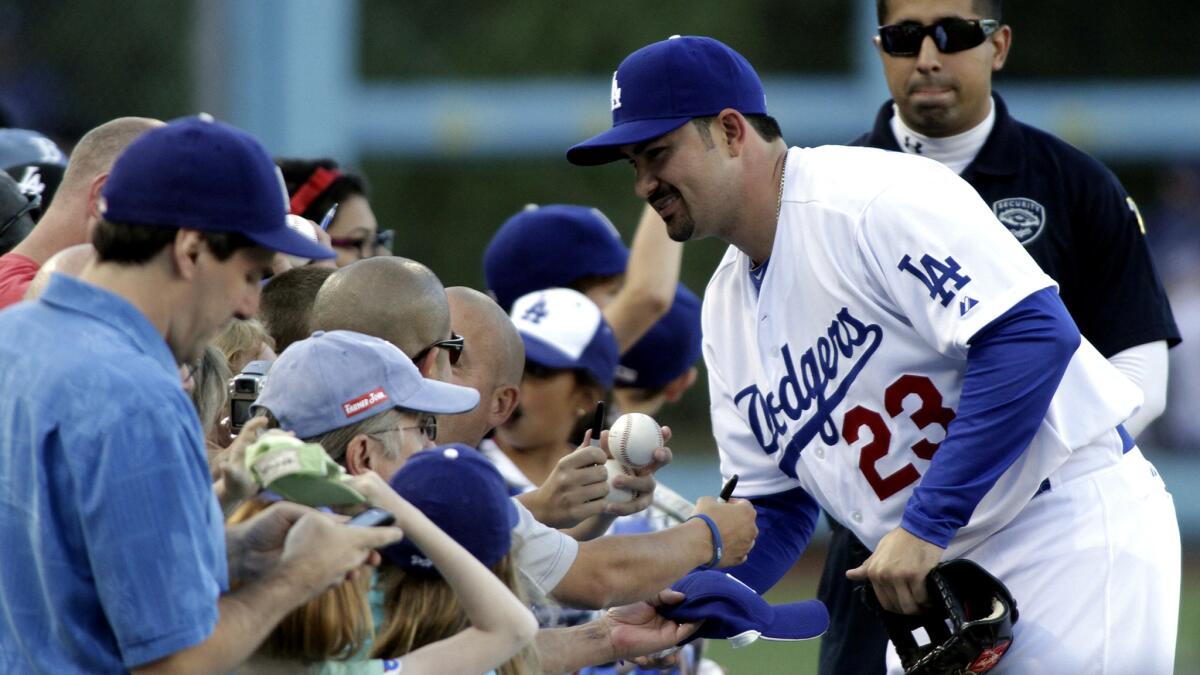
- Share via
Adrián González isn’t some uninformed former jock.
He’s as thoughtful now as he was as an all-star first baseman for the Dodgers, so consider that when reading what he has to say about the possibility of a 2020 baseball season.
“I honestly don’t see a way to salvage it,” González said in an interview with the Los Angeles Times this weekend.
Yikes.
This is an opinion that’s informed by experience. As a player, he served on the union’s executive board. In retirement, he’s become an owner, with a portfolio that includes several Jersey Mike’s franchises as well as a stake in Calidad Beer.
And he’s never been known for making outrageous remarks for the sake of attention.
While the NBA and NHL take steps to resume, MLB is arguing with its players over money. Baseball will lose a great deal if no season is played.
As baseball owners and players remain in a staredown over the economic and coronavirus-related health details of a potential season, González explained why reaching an agreement would be difficult.
From González’s perspective, saving the season would require owners to open their books, which they never have done and probably never will. So long as that’s the case, the players will remain justifiably suspicious of any of their claims of financial hardship and reluctant to accept any salary reductions proposed by the league.
Although voices in and around the game have called for a compromise, neither side has any room to budge. Transparency is an all-or-nothing issue. Partial transparency isn’t transparency.
Which is why González is skeptical about a season taking place, however bothered he might be by how the sport’s audience would be impacted.
“I get it,” he said. “It’s about having a game for the fans.”
He is also sensitive to how the acrimonious negotiations look from the outside.
“It’s really hard to speak about losing some dollars when some people are losing their jobs,” González said. “You don’t want to offend somebody because you know how hard everybody’s had it. You’re almost talking about what people call champagne problems.”
The main concern of black people right now isn’t whether they’re standing three or six feet apart, but whether their sons, husbands, brothers and fathers will be murdered by cops.
But González said that didn’t mean the players should cave to the owners.
“You can’t just give up everything to get something going and destroy the whole business,” González said.
If anything, González believes the players have a responsibility to future generations of players to hold a line.
“I understand why people went on strike for us and I would hate for people to forget about that,” he said.
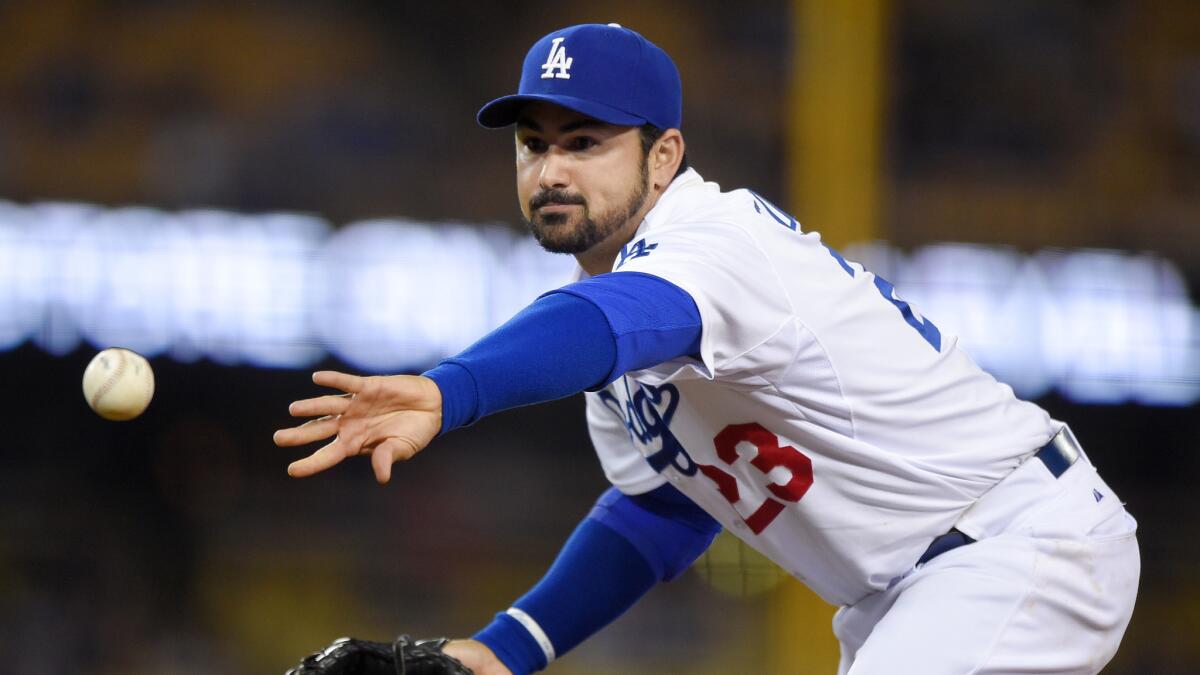
“You can’t just give up everything to get something going and destroy the whole business.”
The players’ strike in 1994, for example, prevented the implementation of a salary cap. That paved the way for González, who broke into the major leagues with the Texas Rangers in 2004, to earn more than $190 million over a 15-year career.
Without naming names, González wondered how former players who were beneficiaries, the biggest beneficiaries, of previous labor efforts could turn their backs on the union. In recent weeks, former players such as Alex Rodriguez and Mark Teixeira called on players to make massive concessions to the owners to expedite the game’s return.
González made it a point to mention how the overwhelming majority of players weren’t afforded anywhere near the financial security he enjoyed. Most of them will be out of the game by their mid-30s; many will start new careers without having gotten a college degree.
This is reality, yet González knows players are viewed as greedy whenever they stand up to the owners.
“I think the most frustrating part about that is the fact that [the owners are] going to play this card, and the minute the agreement is made, they’re going to ask the players to help them promote the league,” he said. “But, again, it goes down to transparency. As far as revenue, what walks in the door and what is sold in the stadium and what is generated via TV, if that is put out there, then you know how much is really involved. But nobody’s doing that.”
González said he believed the league made a mistake by proposing a sliding pay scale in which the highest-paid players would have their salaries reduced the most, by nearly 80% in some cases. Those players are not only influential, but they also have the financial wherewithal to sit out a season.
“You’ve already created such a bad taste in their mouths,” he said, that players would likely “hold to what they initially said,” a demand to be paid a prorated share of their salaries.
“You’ve already created such a bad taste in their mouths that I think (the players are) just going to hold to what they initially said.”
González said that if he were advising the union, he would encourage it to shift its focus to the next collective bargaining agreement. The current CBA expires at the end of the 2021 season.
“It’s hard for me to say that because of what the fans want,” he said. “This year is already going to be half a season, maybe less. It’s already going to be kind of awkward to get things going. People are going to get sick. We might start up and have to shut down again. I would say let’s just work on what we want in the collective bargaining agreement for next year and let’s just get that one right.”
As for the other side, González said, “Honestly, if I’m the owners, I would just try to have non-40-man roster[s] play a season and give fans something to watch.”
It’s an extreme idea, a partial season with minor league players, one still likely to upset fans and harm the game, but González maintains faith that the sport can recover, just as it did from the 1994 strike.
“Baseball’s always going to be there,” he said.
More to Read
Are you a true-blue fan?
Get our Dodgers Dugout newsletter for insights, news and much more.
You may occasionally receive promotional content from the Los Angeles Times.

